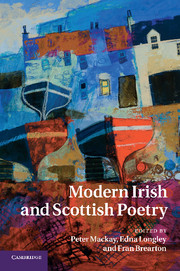Book contents
- Frontmatter
- Contents
- List of contributors
- Acknowledgements
- Introduction
- 1 Swordsmen: W. B. Yeats and Hugh MacDiarmid
- 2 Tradition and the individual editor: Professor Grierson, modernism and national poetics
- 3 Louis MacNeice among the islands
- 4 Townland, desert, cave: Irish and Scottish Second World War poetry
- 5 Affinities in time and space: reading the Gaelic poetry of Ireland and Scotland
- 6 Contemporary affinities
- 7 The Classics in modern Scottish and Irish poetry
- 8 Translating Beowulf: Edwin Morgan and Seamus Heaney
- 9 Reading in the gutters
- 10 ‘What matters is the yeast’: ‘foreignising’ Gaelic poetry
- 11 Outside English: Irish and Scottish poets in the East
- 12 Names for nameless things: the poetics of place names
- 13 Desire lines: mapping the city in contemporary Belfast and Glasgow poetry
- 14 ‘The ugly burds without wings’?: reactions to tradition since the 1960s
- 15 ‘And cannot say / and cannot say’: Richard Price, Randolph Healy and the dialogue of the deaf
- 16 On ‘The Friendship of Young Poets’: Douglas Dunn, Michael Longley and Derek Mahon
- 17 ‘No misprints in this work’: the poetic ‘translations’ of Medbh McGuckian and Frank Kuppner
- 18 Phoenix or dead crow? Irish and Scottish poetry magazines, 1945–2000
- 19 Outwith the Pale: Irish–Scottish studies as an act of translation
- Guide to further reading
- Index
- References
12 - Names for nameless things: the poetics of place names
Published online by Cambridge University Press: 18 April 2011
- Frontmatter
- Contents
- List of contributors
- Acknowledgements
- Introduction
- 1 Swordsmen: W. B. Yeats and Hugh MacDiarmid
- 2 Tradition and the individual editor: Professor Grierson, modernism and national poetics
- 3 Louis MacNeice among the islands
- 4 Townland, desert, cave: Irish and Scottish Second World War poetry
- 5 Affinities in time and space: reading the Gaelic poetry of Ireland and Scotland
- 6 Contemporary affinities
- 7 The Classics in modern Scottish and Irish poetry
- 8 Translating Beowulf: Edwin Morgan and Seamus Heaney
- 9 Reading in the gutters
- 10 ‘What matters is the yeast’: ‘foreignising’ Gaelic poetry
- 11 Outside English: Irish and Scottish poets in the East
- 12 Names for nameless things: the poetics of place names
- 13 Desire lines: mapping the city in contemporary Belfast and Glasgow poetry
- 14 ‘The ugly burds without wings’?: reactions to tradition since the 1960s
- 15 ‘And cannot say / and cannot say’: Richard Price, Randolph Healy and the dialogue of the deaf
- 16 On ‘The Friendship of Young Poets’: Douglas Dunn, Michael Longley and Derek Mahon
- 17 ‘No misprints in this work’: the poetic ‘translations’ of Medbh McGuckian and Frank Kuppner
- 18 Phoenix or dead crow? Irish and Scottish poetry magazines, 1945–2000
- 19 Outwith the Pale: Irish–Scottish studies as an act of translation
- Guide to further reading
- Index
- References
Summary
‘Ignorance is one of the sources of poetry’, claimed Wallace Stevens: ‘One's ignorance is one's chief asset.’ Hugh MacDiarmid agreed: ‘Comprehensibility is error: Art is beyond understanding.’ Such assertions might be borne in mind when Seamus Heaney, regarding the eponymous place name of his poem ‘Broagh’, brings attention to ‘that last / gh the strangers found / difficult to manage’. Heaney may appear to be saying ‘hands off’ to non-native speakers of his vernacular. Yet most of his readers, one assumes, are ignorant of his vernacular. As such, rather than saying ‘hands off’, it might be argued that Heaney is, in fact, inducting his readers into one of the chief sources of poetry.
Irish and Scottish poets often make place names perform two basic functions. First and foremost, they can create an effect of verisimilitude, rooting a poem in the actual and making it concrete. Second, the use of regional place names can be a means of asserting the cultural and artistic validity of erstwhile marginalised places and traditions. However, Irish and Scottish critics have arguably exaggerated this tribal or identitarian element; and place names in poetry can do a lot more.
Vernacular writing infects readers' ears with irregular sound, a form of otherness or inlaid ignorance within standard language, enriching it with what MacDiarmid called an ‘inexhaustible quarry of subtle and significant sound’.
- Type
- Chapter
- Information
- Modern Irish and Scottish Poetry , pp. 204 - 221Publisher: Cambridge University PressPrint publication year: 2011
References
- 1
- Cited by



